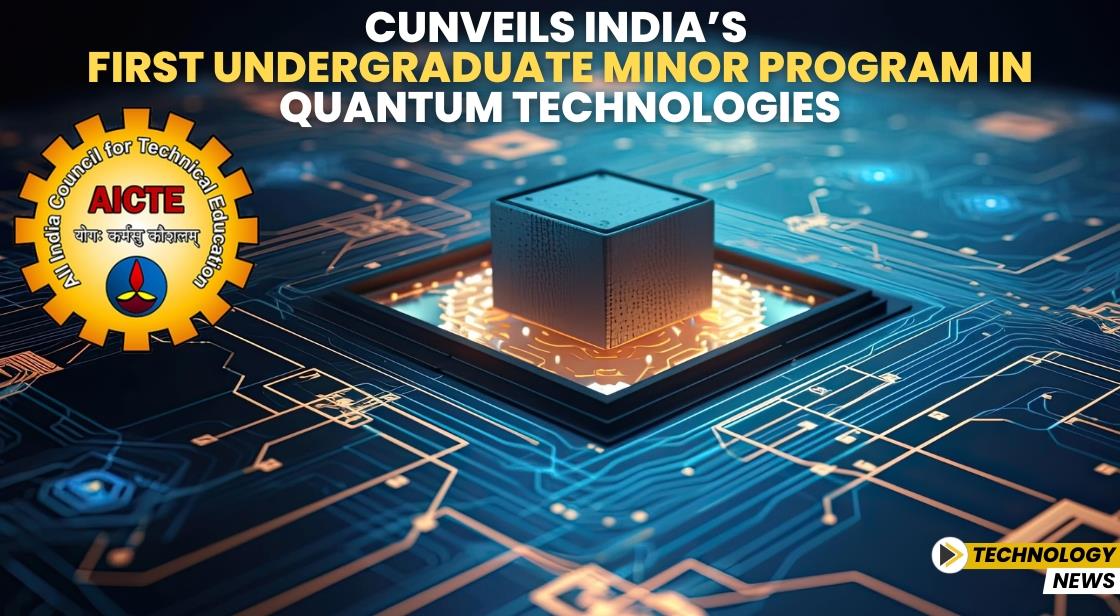AICTE Unveils India’s First Undergraduate Minor Program in Quantum Technologies

News Synopsis
The All India Council for Technical Education (AICTE), in partnership with the National Quantum Mission (NQM) under the Department of Science and Technology (DST), launched India’s first-ever Undergraduate (UG) Minor programme in Quantum Technologies. This groundbreaking initiative aims to position India as a global leader in quantum technology innovation, fostering a workforce ready for the future of quantum advancements.
Objective of the Quantum Technologies Programme
The primary goal of the UG Minor programme in Quantum Technologies is to prepare India’s workforce for the ongoing quantum revolution. The initiative will help meet the growing demand for skilled professionals capable of driving innovations across various quantum fields. The programme seeks to bridge the gap between academia and industry by focusing on the strategic and multidisciplinary aspects required for the quantum ecosystem.
Programme Structure and Vertical Focus
The curriculum of the Quantum Technologies UG Minor programme is designed to address four key verticals:
-
Quantum Computation and Simulation
-
Quantum Communication and Cryptography
-
Quantum Sensing
-
Quantum Materials and Devices
These verticals cover the critical components of the quantum space, ensuring that students receive a comprehensive education in quantum technologies. Students will learn to navigate the rapidly evolving landscape, preparing them for roles in research, development, and industry innovation.
Launch Event and Key Speakers
The programme was officially launched during an event attended by notable dignitaries such as AICTE Chairman Prof. TG Sitharam, DST Secretary Prof. Abhay Karandikar, and National Quantum Mission Governing Board Chairman Dr. Ajai Chowdhry. The event highlighted the importance of this initiative in shaping India’s future in quantum technology.
Prof. TG Sitharam, Chairman of AICTE, emphasized the transformative potential of quantum technologies, noting how the curriculum is designed to nurture a workforce capable of driving advancements in computing, communication, and sensing. He also pointed to AICTE’s efforts to complement this initiative through mandatory internships and IDEA Labs to ensure a quantum-ready talent pool.
Curriculum Design and Flexibility
The Quantum Technologies UG Minor programme boasts a flexible, modular curriculum. Engineering students in their third semester or beyond will have the opportunity to select 18 credits from a pool of 30. The programme emphasizes project-based learning, ensuring that students gain hands-on experience in quantum technology, which is critical to mastering the subject. This flexibility allows institutions to tailor the programme according to their resources and capabilities.
Prof. Arindam Ghosh, Chairman of the Curriculum Drafting Committee, explained that this curriculum covers all quantum verticals, ensuring that quantum technology becomes a viable career path for students. The interdisciplinary approach of the programme ensures that students from various engineering disciplines can participate and gain insights into this cutting-edge field.
Faculty Development Programmes (FDPs) and Support
To ensure that faculty members are well-equipped to teach the new quantum technologies curriculum, AICTE will collaborate with prestigious institutions like the Indian Institutes of Technology (IITs) to organize Faculty Development Programmes (FDPs). These programmes will provide educators with the training needed to deliver high-quality education on quantum topics. Dedicated textbooks tailored to undergraduate quantum education will also be developed, ensuring consistent delivery and excellence across institutions.
Establishment of Quantum Technology Laboratories
AICTE and the Department of Science and Technology (DST) plan to establish state-of-the-art quantum technology laboratories across various institutions. These labs will provide students with access to advanced tools, fostering hands-on experience and facilitating the application of quantum technologies in real-world scenarios. The collaboration between AICTE and DST will help create an ecosystem that supports research and innovation in quantum technologies, further strengthening India’s position in the global quantum arena.
Long-Term Vision and Sustainability
The launch of India’s first UG Minor programme in Quantum Technologies is a significant step toward building a robust quantum ecosystem. The initiative includes expert-led FDPs, state-of-the-art lab setups, and the development of specialized textbooks, ensuring the programme’s sustainability and long-term impact. AICTE and DST are committed to addressing challenges like teacher training and infrastructure to ensure the programme’s successful implementation in the upcoming academic session.
Prof. Abhay Karandikar, DST Secretary, highlighted the importance of this initiative in overcoming challenges related to faculty training and infrastructure, and affirmed that AICTE and DST would provide continuous support to ensure the programme’s effectiveness.
Conclusion
This initiative is a step forward in nurturing the talent pool required to drive India’s quantum technology revolution. With a clear focus on interdisciplinary learning, practical experience, and faculty development, AICTE’s UG Minor programme in Quantum Technologies will create a skilled workforce that will contribute to India’s global leadership in quantum innovation.
You May Like









